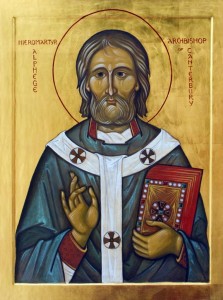How many of the saints of God have lived their holy lives in the terrible atmosphere of war, with the constant threat of attack and violent death? Perhaps it is this very atmosphere of terror that causes some Christians to follow the path of our Savior in sacrificing their lives for a greater good.
St. Alphege (Aelfheah), bishop and martyr, lived in England in a time of siege. He had been born around the year 953, had become a monk early in life and, after a few years, had retreated to the life of a hermit in Somerset. But St. Dunstan, the Archbishop of Canterbury (and a relative), called Alphege from this solitary life first to be the abbot of Bath Abbey, and then to become Bishop of Winchester in the year 984.
In the 400 years since the arrival of St. Augustine and his monks to re-establish and spread Christianity in this land, the heathen had been converted, a degree of unity had been established in the Church, and missionaries had been sent to convert Germanic people. But the English had suffered through periods of brutal attacks by Scandinavian Vikings who invaded, plundered and pillaged, and sometimes remained to settle in the land. After a brief time of relative quiet, these raids began anew about the time of Alphege’s consecration.
This time the Norsemen were not satisfied with stealing goods and burning villages, but were intent on overtaking the English people and ruling the land themselves. Larger, more organized groups of warriors came, and they were led by the highest-ranking war lords. Christian England attributed the brutality of their attackers to the fact that they were heathen who prayed to the pagan gods Odin and Thor and who placed their faith in violent methods of warfare.
Bishop Alphege ministered faithfully to his people in the midst of this turmoil. Preaching Christ’s Gospel of peace, he continued to live the disciplined life which he had learned as a monk and he cared especially for the poor and destitute.
English rulers established a policy of paying tribute (the “Danegeld”) to the invaders, hoping to achieve some sort of peace with them. In 994 King Ethelred asked Bishop Alphege to negotiate with the Norse leaders Swein and Anlaf (Olaf). The holy bishp received a promise to end the violence from Anlaf (who, perhpas through the example of St. Alphege, was later baptized and became the first Christian king of Norway), but Swein was less willing to make such promises.
In 1005, Alphege became Archbishop of Canterbury, with responsibility for the care of all English souls. Despite the continuing devastation of war with the Vikings, he concerned himself with holiness of living and gave the people a perfect example in his own life. He called a local council in 1009 to deal with disciplinary matters.
The Danish invasion grew worse in 1011, culminating in the siege and capture of Canterbury in September of that year. Hostages were taken – the Archbishop among them – and a huge ransom demanded. This was paid for all but the Archbishop, who refused to allow his war-weary people to pay the required price. This decision proved fatal for St. Alphege. The Anglo-Saxon Chronicle described the next events in this way:
In this year [1012], before Easter, there came to London ealdorman Eadric and all the chief councillors of England, spiritual and temporal. In this year Easter was on 13 April. And they remained there until after Easter, until all the tribute was paid, amounting to eight thousand pounds. Then on the Saturday the host [the Vikings] became greatly incensed against the bishop, because he was not willing to offer them any money, and forbade any ransom to be given for him. Morever they were very drunk, for wine had been brought to them from the south. Then they took the bishop, and led him to their tribunal, on Saturday evening, within the octave of Easter, and pelted him to death with bones and the heads of cattle; and one of them smote him on the skull with the iron of an axe, so that with the blow he sank down and his holy blood fell upon the earth, and his holy soul was sent forth to God’s kingdom. Then in the morning the bishops Eadnoth and Aelfhun and the citizens received his holy body, and brought it to London with all reverence, and buried it in St. Paul’s church, where now God makes manifest the miracles of the holy martyr.
The misery of the years of Danish invasion gradually gave way to acceptance of the Vikings as rulers. Swein’s son, Cnut, eventually became king of the whole realm (in 1019). As an indication of changed attitudes and a sign of reconciliation, King Cnut gave permission for the translation of St. Alphege’s relics (in 1023) to Canterbury, where they were re-buried near the high altar in the Cathedral, and many came to venerate. Another opening of the tomb in 1105 revealed that the saint’s holy relics had remained incorrupt.
Was St. Alphege simply a national hero, who was brutally murdered by the enemies of his country when he refused to give in to their demands? The Church has held that, in God’s plan, St. Alphege was a holy martyr, who in life as well as untimely and cruel death, showed charity, pity, and steadfast faith in the saving mercy of God. By his martyrdom, he witnessed for this faith both to his own people and also to their adversaries, who eventually converted to Christianity. Through the intercessions of St. Alphege, bishop and martyr, may God have mercy on us.
[Sources: From Alfred to Henry III: 871-1272, by Christopher Brooke; The Anglo-Saxon Chronicle, translated by G. N. Garmonsway; The Pre-Conquest Church in England, by Margaret Dearnesley; The Oxford Dictionary of Saints, by Hugh Farmer; The Oxford Dictionary of the Christian Church, edited by F. L. Cross.]
